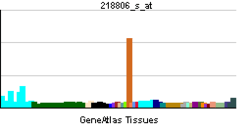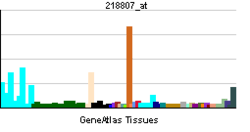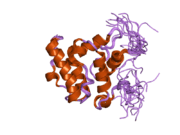VAV3
| View/Edit Human | View/Edit Mouse |
Guanine nucleotide exchange factor VAV3 is a protein that in humans is encoded by the VAV3 gene.[4]
This gene is a member of the VAV gene family. The VAV proteins are guanine nucleotide exchange factors (GEFs) for Rho family GTPases that activate pathways leading to actin cytoskeletal rearrangements and transcriptional alterations. This gene product acts as a GEF preferentially for RhoG, RhoA, and to a lesser extent, RAC1, and it associates maximally with the nucleotide-free states of these GTPases. Alternatively spliced transcript variants encoding different isoforms have been described for this gene.[4]
Interactions
VAV3 has been shown to interact with Grb2.[5][6]
References
- ↑ "Diseases that are genetically associated with VAV3 view/edit references on wikidata".
- ↑ "Human PubMed Reference:".
- ↑ "Mouse PubMed Reference:".
- 1 2 "Entrez Gene: VAV3 vav 3 oncogene".
- ↑ Blagoev, Blagoy; Kratchmarova Irina; Ong Shao-En; Nielsen Mogens; Foster Leonard J; Mann Matthias (March 2003). "A proteomics strategy to elucidate functional protein-protein interactions applied to EGF signaling". Nat. Biotechnol. United States. 21 (3): 315–318. doi:10.1038/nbt790. ISSN 1087-0156. PMID 12577067.
- ↑ Zeng, L; Sachdev P; Yan L; Chan J L; Trenkle T; McClelland M; Welsh J; Wang L H (December 2000). "Vav3 mediates receptor protein tyrosine kinase signaling, regulates GTPase activity, modulates cell morphology, and induces cell transformation". Mol. Cell. Biol. UNITED STATES. 20 (24): 9212–9224. doi:10.1128/MCB.20.24.9212-9224.2000. ISSN 0270-7306. PMC 102179
 . PMID 11094073.
. PMID 11094073.
Further reading
- Hobert O, Schilling JW, Beckerle MC, et al. (1996). "SH3 domain-dependent interaction of the proto-oncogene product Vav with the focal contact protein zyxin". Oncogene. 12 (7): 1577–81. PMID 8622875.
- Tamma SM, Chirmule N, Yagura H, et al. (1997). "CD4 cross-linking (CD4XL) induces RAS activation and tumor necrosis factor-alpha secretion in CD4+ T cells". Blood. 90 (4): 1588–93. PMID 9269777.
- Trenkle T, Welsh J, Jung B, et al. (1998). "Non-stoichiometric reduced complexity probes for cDNA arrays". Nucleic Acids Res. 26 (17): 3883–3891. doi:10.1093/nar/26.17.3883. PMC 147802
 . PMID 9705494.
. PMID 9705494. - Movilla N, Bustelo XR (1999). "Biological and regulatory properties of Vav-3, a new member of the Vav family of oncoproteins". Mol. Cell. Biol. 19 (11): 7870–85. PMC 84867
 . PMID 10523675.
. PMID 10523675. - Trenkle T, McClelland M, Adlkofer K, Welsh J (2000). "Major transcript variants of VAV3, a new member of the VAV family of guanine nucleotide exchange factors". Gene. 245 (1): 139–149. doi:10.1016/S0378-1119(00)00026-3. PMID 10713454.
- Zeng L, Sachdev P, Yan L, et al. (2001). "Vav3 mediates receptor protein tyrosine kinase signaling, regulates GTPase activity, modulates cell morphology, and induces cell transformation". Mol. Cell. Biol. 20 (24): 9212–9224. doi:10.1128/MCB.20.24.9212-9224.2000. PMC 102179
 . PMID 11094073.
. PMID 11094073. - Inabe K, Ishiai M, Scharenberg AM, et al. (2002). "Vav3 modulates B cell receptor responses by regulating phosphoinositide 3-kinase activation". J. Exp. Med. 195 (2): 189–200. doi:10.1084/jem.20011571. PMC 2193613
 . PMID 11805146.
. PMID 11805146. - Yabana N, Shibuya M (2002). "Adaptor protein APS binds the NH2-terminal autoinhibitory domain of guanine nucleotide exchange factor Vav3 and augments its activity". Oncogene. 21 (50): 7720–7729. doi:10.1038/sj.onc.1205927. PMID 12400014.
- Ota T, Suzuki Y, Nishikawa T, et al. (2004). "Complete sequencing and characterization of 21,243 full-length human cDNAs". Nat. Genet. 36 (1): 40–45. doi:10.1038/ng1285. PMID 14702039.
- Zakaria S, Gomez TS, Savoy DN, et al. (2004). "Differential regulation of TCR-mediated gene transcription by Vav family members". J. Exp. Med. 199 (3): 429–434. doi:10.1084/jem.20031228. PMC 2211790
 . PMID 14757747.
. PMID 14757747. - Pearce AC, Senis YA, Billadeau DD, et al. (2005). "Vav1 and vav3 have critical but redundant roles in mediating platelet activation by collagen". J. Biol. Chem. 279 (52): 53955–53962. doi:10.1074/jbc.M410355200. PMID 15456756.
- Charvet C, Canonigo AJ, Billadeau DD, Altman A (2005). "Membrane localization and function of Vav3 in T cells depend on its association with the adapter SLP-76". J. Biol. Chem. 280 (15): 15289–15299. doi:10.1074/jbc.M500275200. PMID 15708849.
- Lyons LS, Burnstein KL (2006). "Vav3, a Rho GTPase guanine nucleotide exchange factor, increases during progression to androgen independence in prostate cancer cells and potentiates androgen receptor transcriptional activity". Mol. Endocrinol. 20 (5): 1061–1072. doi:10.1210/me.2005-0346. PMID 16384856.
- Dong Z, Liu Y, Lu S, et al. (2006). "Vav3 oncogene is overexpressed and regulates cell growth and androgen receptor activity in human prostate cancer". Mol. Endocrinol. 20 (10): 2315–2325. doi:10.1210/me.2006-0048. PMID 16762975.
This article is issued from Wikipedia - version of the 6/6/2016. The text is available under the Creative Commons Attribution/Share Alike but additional terms may apply for the media files.



